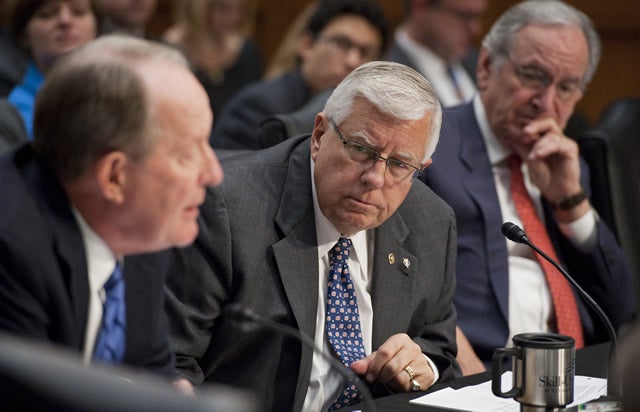If you think No Child Left Behind (NCLB) isn’t working, what Senators Tom Harkin (D–IA) and Mike Enzi (R–WY) have in mind for the nation’s schools is only going to make things worse.

From left, Republican Conference Chair Lamar Alexander, R-Tenn., Sen. Mike Enzi, R-Wyo., ranking member, and Chairman Tom Harkin, D-Iowa, conduct a Senate Health, Education, Labor and Pensions Committee markup in Hart Building of legislation to reauthorize the "Elementary and Secondary Education Act" on October 20, 2011. (Photo By Tom Williams/CQ Roll Call)
In an attempt to reauthorize the Elementary and Secondary Education (ESEA) Act of 1965 for a ninth time, the Senate Health, Education, Labor, and Pensions (HELP) Committee advanced a proposal late Thursday night with over 1,000 pages of federal policy for local schools. (As if NCLB’s 600 pages weren’t enough.)
On top of the content itself, one more problem with this proposal is the short timeline on which it has been debated. Nancy Pelosi (D-CA) infamously said that Congress would have “to pass the [health care] bill so you can find out what is in it.” Senators Harkin and Enzi appear to be following suit, releasing the full text of the massive ESEA rewrite only days prior to the markup.
Senator Richard Burr (R–NC) was not pleased, as he noted during Wednesday morning’s markup:
In 17 years of serving in congress, I’m not sure that I’ve ever, in the minority, found myself the recipient of an 868 page bill on the Friday before a Wednesday markup. And the leadership of the committee suggested that there had been consultation.… [T]here was no consultation with me. I got the text of this bill the same time it was released to the public. I don’t think that was a mistake. I think it was on purpose.
Similarly, Senator Rand Paul (R–KY) wrote in a letter last Tuesday to Chairman Harkin and Ranking Member Enzi:
The HELP Committee has not held a single hearing on this bill since I have been here. We have not had enough time to allow the teachers, superintendents, and principals in our states who specialize in educating our children to review this legislation. We have not had time to thoroughly read and review this bill to determine whether it will actually help our children, or whether it will, in fact, make matters worse.”
Well, The Heritage Foundation’s Lindsey Burke has read the bill and concludes that it will, in fact, make matters worse. Sure, the proposal does away with “adequate yearly progress”—one of the most loathed aspects of NCLB. But it would replace it with requirements that states prove that they have “college- and career-ready” standards, giving Washington more control over the content taught in local schools.
Nearly five decades of failed federal involvement in education has yet to convince Congress that governing schools from Washington doesn’t work. Academic achievement remains stagnant as greater federal regulation forces schools to focus on Washington’s demands rather than look to the needs of those whom they are meant to serve: children and families.
Instead of more mandates from Washington, schools need flexibility and freedom to implement the policies they decide are best for the students in their state. As Burr stated at Wednesday’s markup:
I can’t compare North Carolina to Wyoming. I can’t compare it to Iowa. Our schools are made up of a different group of individuals.… To suggest that what works there is the answer that we need in North Carolina is absurd. And so when we talk about flexibility, let’s make sure that flexibility is open to all and that it’s not conditional upon doing something that we’ve federally mandated.



























